8 Steps to Register a Company in Hong Kong Online [2026]

Hong Kong is one of the easiest places in the world to start a business when you know the steps to take.
Having helped hundreds of entrepreneurs and business owners successfully incorporate their companies in Hong Kong, I’ve seen how easy it is to get caught up in the paperwork and local requirements. Without the right guidance, these processes can quickly eat up valuable time, time that’s better spent building your business.
This is why I put together this step-by-step guide to give you a clear, practical roadmap. It covers everything you need from the first step all the way to post-incorporation, including documents, business account, and even tax exemptions.
Content

What You Need to Start a Company in Hong Kong
Hong Kong allows both residents and non-residents to register a company, and the rules are the same for everyone. There are no restrictions on foreign ownership, meaning a company can be 100% foreign-owned, and there is no requirement to appoint a local director.
Whether you are based in Hong Kong or abroad, you can set up a company remotely as long as you meet the minimum statutory requirements.
To register a Hong Kong company, you must have the following in place:
- At least one director and one shareholder. Both can be of any nationality, and one person can hold both roles.
- A local company secretary. This must be either a Hong Kong resident or a corporate service provider licensed as a Trust or Corporate Service Provider (TCSP).
- A registered office address in Hong Kong. This must be a physical address where official documents can be delivered. PO boxes are not permitted.
- Share capital of at least HKD 1. Hong Kong does not impose a minimum capital requirement, so most companies start with a nominal amount.
These requirements form the foundation of every private limited company in Hong Kong and must be in place before you begin the online incorporation process.

Cost and Timeline at a Glance
Getting a clear picture of the costs and timeline involved makes it easier to plan your next steps and avoid surprises. The figures below reflect what entrepreneurs typically encounter when setting up a company in Hong Kong.
How Much Does It Cost to Register a Company?
Based on the responses from a survey of 512 companies, conducted by Statrys, the average Hong Kong company incorporation cost is HKD 9,474. Entrepreneurs who use a Hong Kong company registration service generally pay between HKD 6,000 and up to HKD 12,000.
To understand how these figures are built, it helps to look at the mandatory government fees, which form the foundation of every incorporation package:
Company Registration Fee (one-time fee to the Companies Registry):
- Electronic application: HKD 1,545
- Hard copy application: HKD 1,720
Business Registration Fee (annual fee to the Inland Revenue Department):
- 1-year certificate: HKD 2,200
- 3-year certificate: HKD 6,020
These fees alone amount to roughly HKD 3,745. This explains why the lowest cost reported in the survey— HKD 4,000—typically reflects only the minimum statutory charges. This figure does not account for other essential factors, such as:
- A company secretary
- A registered office address
- CPA certification of identification documents
These additional items are mandatory for all Hong Kong companies and are often charged separately, which is why most entrepreneurs end up paying more than the minimum government fees.
How Long Does the Incorporation Process Take?
The average time to incorporate a company in Hong Kong is 3 to 5 working days. According to the respondents in Statrys' survey, 91% of the participants completed their company incorporation within a week.
The actual timeline depends on how quickly the required documents are prepared and submitted, as well as the company’s profile. Applications involving higher-risk business activities or corporate shareholders may take longer, as these cases typically require additional verification by the Companies Registry or other authorities.


8 Steps to Register a Company in Hong Kong - A Quick Summary
Here's a quick overview of the eight essential steps you’ll need to follow:
Some activities require additional approval before or after incorporation.
Most entrepreneurs select a Private Limited Company for liability protection and operational flexibility.
Decide on your directors, shareholders, and share capital..
Ensure the name follows Companies Registry rules and is not already in use or trademarked.
This must be a Hong Kong resident or a licensed TCSP, responsible for key compliance tasks.
A physical address in Hong Kong is required. PO boxes cannot be used.
Gather identification documents, proof of address, the Articles of Association, and your incorporation form.
File your incorporation documents with the Companies Registry and pay the government fee.
Let’s break down each step in detail.
Step 1: Check If You Need a Business License
Depending on the industry and the nature of your business, a business licence may be required. You can apply for the licence after your company has been successfully incorporated with the Company Registry, but it is advisable to explore which business licences you may need before incorporating your company, as a few have requirements that may affect how you structure your company, such as minimum capital or specific qualifications.
For instance, a travel agency must have at least HKD 500,000 in paid-up share capital to qualify for a Travel Agent’s Licence.
Below are examples of business categories that require licensing in Hong Kong:
Employment Agencies
Travel Agencies
Educational Institutions
Agricultural Drugs
Cosmetics and Medicines
Restaurants and Food Services
Retail Businesses Involving Import and Export
Trading Companies
Professional Services, such as Accounting or Legal Services
Electrical Equipment and Machinery
You can browse the full list of business types that require a licence using the Hong Kong Business Licence Information Service page.
Step 2: Choose Your Company Type
Hong Kong recognises several statutory company structures under the Companies Ordinance, and each one serves a different purpose depending on how you plan to run your business.
Here are the common types of companies under the Companies Ordinance in Hong Kong:
Private Limited Company (Ltd.)
Also known as private companies limited by shares, this type of entity allows up to 50 shareholders, with liability limited to the amount invested. This is the most commonly chosen structure for SMEs because it offers liability protection.
Private Unlimited Company
A separate legal entity where members’ liability is not limited, so owners remain personally responsible for all debts. It can be used in specific situations but exposes members to significantly higher personal risk.
Public Limited Company (PLC)
Also known as public companies limited by shares. It is listed on the Hong Kong Stock Exchange, allowing public trading of shares through stocks or bonds.
Public Unlimited Company
Members of this company type have unlimited liability for the company's debts. It is often used by professional organisations to facilitate the return of capital to shareholders.
Company Limited by Guarantee
Commonly used by non-profit-making organisations such as associations and clubs, this structure has no share capital and members only agree to contribute a fixed amount if the company is wound up.

While companies incorporated under the Companies Ordinance are the most structured and regulated forms of business in Hong Kong, the city also offers simpler non-corporate business entities. These options have lighter setup requirements but come with different liability and compliance considerations, such as:
- A sole proprietorship, owned and operated by one individual. It is the simplest structure to set up, but the owner bears unlimited personal liability.
- A partnership, formed by two or more individuals. It is straightforward to establish, though partners generally share personal liability unless the firm is a limited partnership.
- A branch office, used by foreign companies that want to operate in Hong Kong without creating a separate local legal entity.
- A representative office, suitable for foreign businesses that only need a non-commercial presence for activities such as marketing, sourcing, or liaison work.
Step 3: Define Your Company Structure
Setting up your company structure mainly involves appointing your company directors and shareholders and deciding on your share capital. These elements determine how your company is owned, managed, and represented.
Directors
Every Hong Kong private limited company must appoint at least one director, and at least one of them must be a natural person aged 18 or above. Additional directors may be individuals or corporate entities.
There is no requirement for directors to be Hong Kong residents, so both local and overseas individuals can serve on the board. The main exception is where a private company is part of a group that includes a listed company, in which case all directors must be natural persons.
Shareholders
A company must have at least one shareholder, who may be an individual or a corporate entity. There are no nationality or residency requirements. A single person can act as both director and shareholder, which is common for small or founder-led companies.
Share Capital
Hong Kong does not impose a statutory minimum share capital. A company can be incorporated with any amount of share capital, and in practice, many small businesses start with a very modest figure, such as one share of HKD 1.
Under the Companies Ordinance, shares have no par value and may be denominated in any currency, which is useful if your business mainly earns or spends in a foreign currency. Bearer share warrants are no longer permitted, and ownership must be recorded in the company’s register of members.
Certain regulated industries, such as financial services, may still be subject to higher paid-up capital requirements under sector-specific rules.

Step 4: Verify Your Company Name
Selecting an appropriate Hong Kong company name and checking its availability is an important step that can save you a lot of time. This is because if the name isn’t suitable, your application could be rejected, meaning you’ll have to start the process all over again, and the lodgement fee will not be refunded.
Here is some guidance on Hong Kong company names:
|
Abbreviations, spaces, punctuation, articles, and capital letters are treated as the same. For example, "Hong Kong," "Hongkong," and "HK" are equivalent, as are "and" and "&." "The ABC Limited" is the same as "ABC Limited”, "A-B-C Limited" and "a b c Limited."
Grammatical variations also do not make a name unique. Words like “trade” and “trading” are treated as the same, and simply adding an “s” or “es” (such as “solution” vs. “solutions”) does not make the name different.

Cultural and Linguistic Considerations: Some English name combinations take on unintended meanings in Cantonese. For example, “PK” can be read as “puk gai” (仆街 / 踣街), which is considered a swear word. Names that are offensive or culturally inappropriate may be refused by the Companies Registry.
Restricted Words for Company Name
Some expressions are restricted in Hong Kong because they may imply government approval, professional licensing, or statutory authority. A company cannot use these terms without first obtaining consent from the Companies Registry or the relevant regulator.
Examples of restricted expressions include, but are not limited to:
For guidance on creating a suitable name, please refer to our guide on the dos and don'ts of Hong Kong company names and insights into naming trends in Hong Kong.
How to Check Name Availability
To ensure your chosen name is available:
- Use the Companies Registry’s e-Services Portal to search the Index of Company Names and see whether an identical or very similar name is already registered.
- Use the Intellectual Property Department’s online Trade Mark Search System to check whether your proposed name, logo, or similar mark has already been registered as a trade mark in Hong Kong.
Names cannot be reserved. The Companies Registry only confirms registrability when your incorporation application is processed, and the lodgement fee will not be refunded if the name is rejected. It is also sensible to run these searches just before applying and to prepare at least two or three backup names in case your first choice is not available.

Step 5: Appoint a Company Secretary
In Hong Kong, every company must appoint a local company secretary. This role is mandatory under the Companies Ordinance and ensures that the company remains compliant with statutory filing and record-keeping obligations.
Changing Your Company Secretary
Companies in Hong Kong may change their company secretary at any time, as long as the position is always filled.
When a change occurs, the Companies Ordinance requires the company to submit Form ND2A (“Notice of Change of Company Secretary and Director”) to the Companies Registry within 15 days of the change taking effect.
There are no legal restrictions on changing the company secretary in Hong Kong, provided that the company always maintains a valid appointment for the position.
Step 6: Get a Registered Address
Every Hong Kong company must have a registered office address in Hong Kong, which serves as the official location for receiving government notices and legal documents.
The address must be a physical premises, not a P.O. box, and it must be accessible for your company secretary to receive and handle documents from authorities such as the Companies Registry and the Inland Revenue Department.
You can meet this requirement in two ways:
Option 1: Use a Registered Address Service Provider
Many businesses use a service provider that offers a compliant registered address together with mail handling or scanning services. This is the most practical option for overseas founders or companies without a physical presence in Hong Kong.
Providers such as Statrys include a registered address as part of their company registration package, ensuring that important documents are received securely and handled promptly.

Option 2: Rent an Office in Hong Kong
Alternatively, you can rent an office space in Hong Kong. Common options are private offices, virtual offices, or coworking spaces, each with its own unique advantages and disadvantages.
- Private Office Space: A dedicated, physical office that fully meets the requirements for a registered address. It offers privacy and control, but is the most expensive option due to Hong Kong’s high commercial rental costs.
- Virtual Office: A cost-effective solution that provides a physical address for receiving mail without the need for an on-site workspace. However, certain regulated or inspection-based industries (e.g. food or activities requiring site checks) may not be permitted to operate using a virtual office address.
- Coworking Space: A shared office environment that can be used as a registered address if the provider offers mail-handling services. Some coworking spaces impose restrictions on receiving government documents or on certain business activities, so suitability depends on the policies of the workspace provider.

Step 7: Prepare the Documents
Below are the essential documents required for incorporating a company in Hong Kong.
- Identification Documents for Directors, Shareholders, and the Company Secretary: Hong Kong Identity Cards, PRC Resident Identity Cards, or passports. If copies are used, they are typically required to be certified by a Hong Kong CPA, solicitor, notary public, licensed TCSP, or a consular officer.
- Proof of Address: Recent documentation confirming the residential address of each director and shareholder, such as a utility bill, bank statement, or government-issued letter. It’s recommended to use documents issued within the last three months.
- Articles of Association: A legal document setting out the company’s internal rules, structure, and governance. You may adopt the government’s Model Articles or submit your own customised articles, which should be clearly formatted with numbered clauses.
- Incorporation Form (NNC1 or NNC1G): The statutory incorporation form that sets out key details of the company, including name, registered office address, business nature, share capital, directors, shareholders, and company secretary. Use Form NNC1 for companies limited by shares and Form NNC1G for companies not limited by shares.
- IRBR1 form: A notice to the Business Registration Office used to apply for your Business Registration Certificate. This form is required for all companies incorporated under the Companies Ordinance.
Each item must be prepared before you submit your incorporation application, unless you are applying online, in which case the NNC1 and IRBR1 forms will be generated automatically by the system.
Step 8: Submit Your Application Online
Once everything is in order, you can start the incorporation process. Most private companies can complete the entire process online. In cases involving corporate or overseas shareholders, the Registry may request certified hard-copy documents, depending on the circumstances.
The online application process is divided into two main parts: creating a user account and completing the application.
Create a User Account
Before submitting any incorporation forms, the Companies Registry requires that a natural person authorised by the company sign the documents through the e-Services Portal. To do this, that person must first create an e-Services account, subscribe to e-Filing Services, and link the account to the company.
This means a director must first register as a user to be able to initiate and sign the application. Here’s how:
Visit https://www.e-services.cr.gov.hk/ and click “Register Now” to go to the User Registration Page.
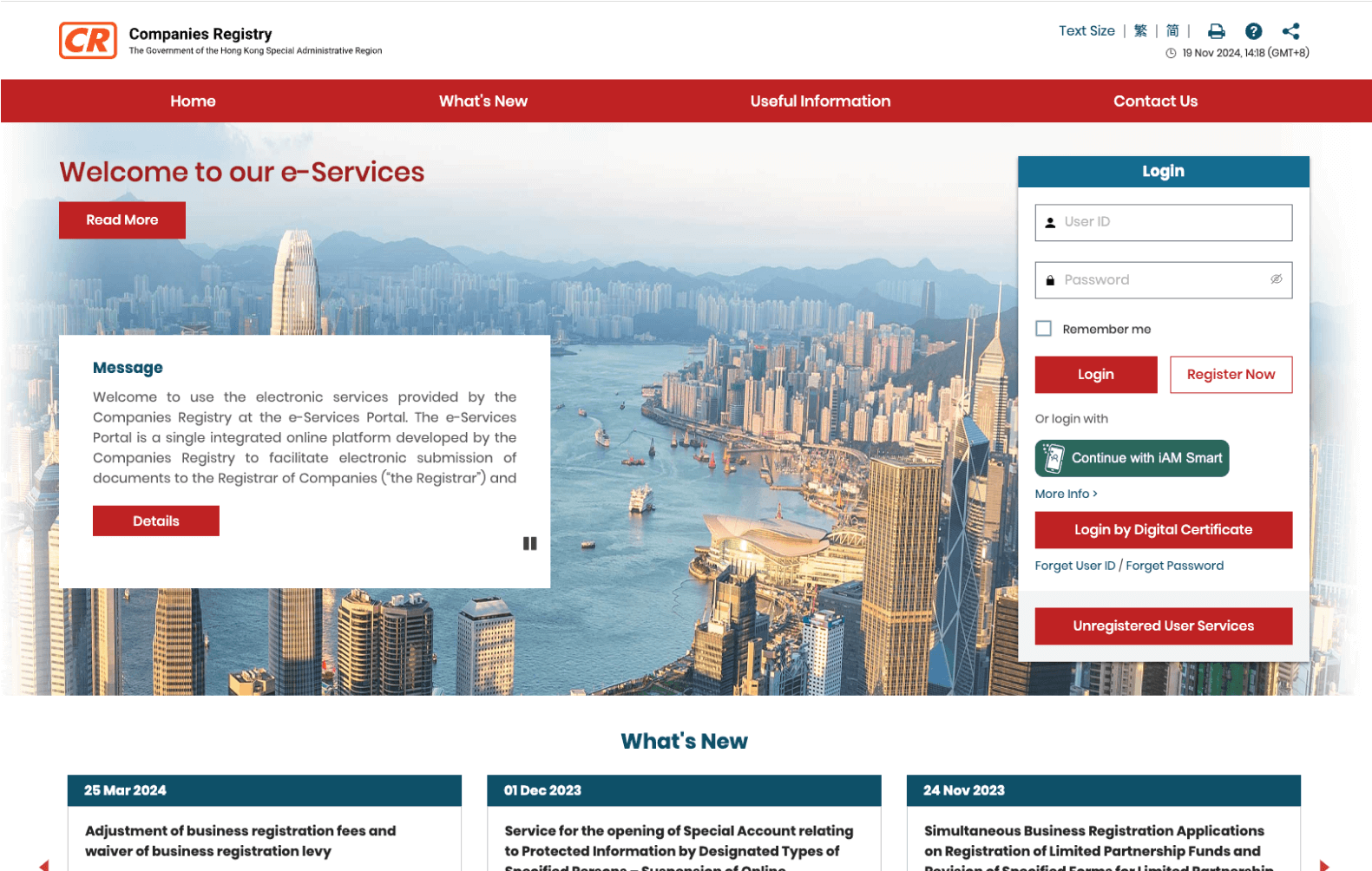
Review and agree to the terms and conditions.
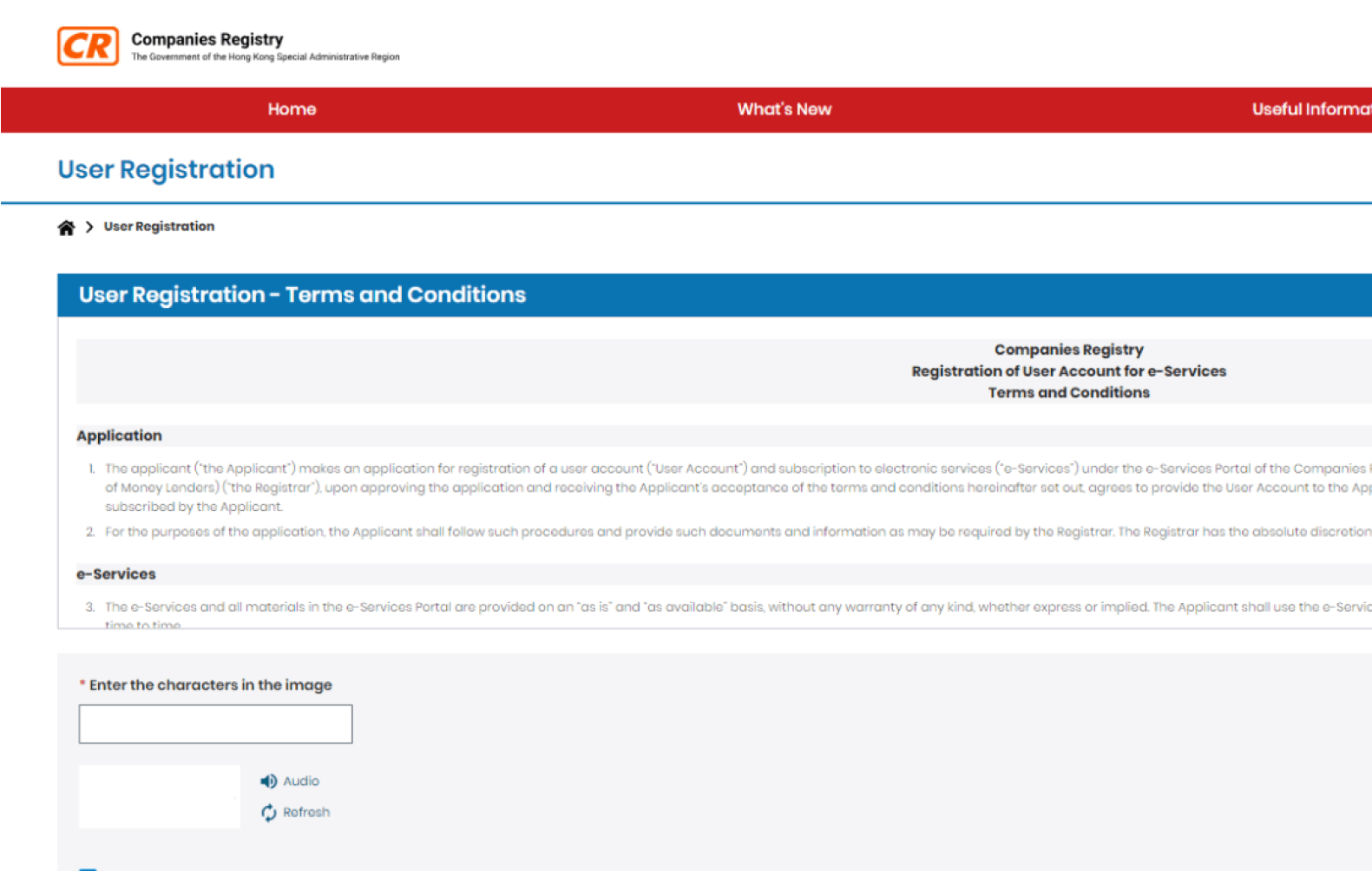
Fill in account details, including what services you want to subscribe to, and create your user ID and password.
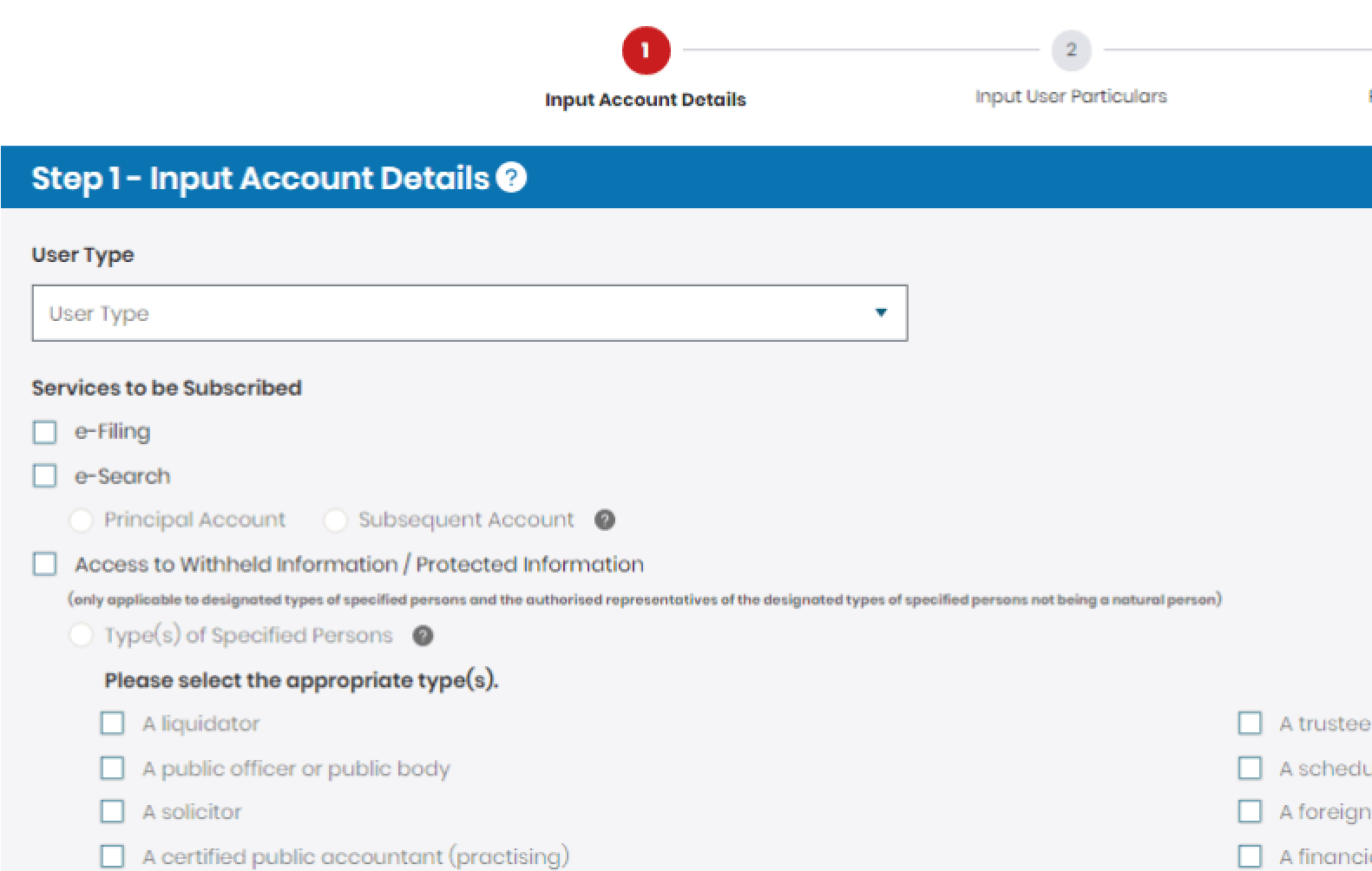
Provide your personal information, including name, residential address, and Hong Kong contact numbers.
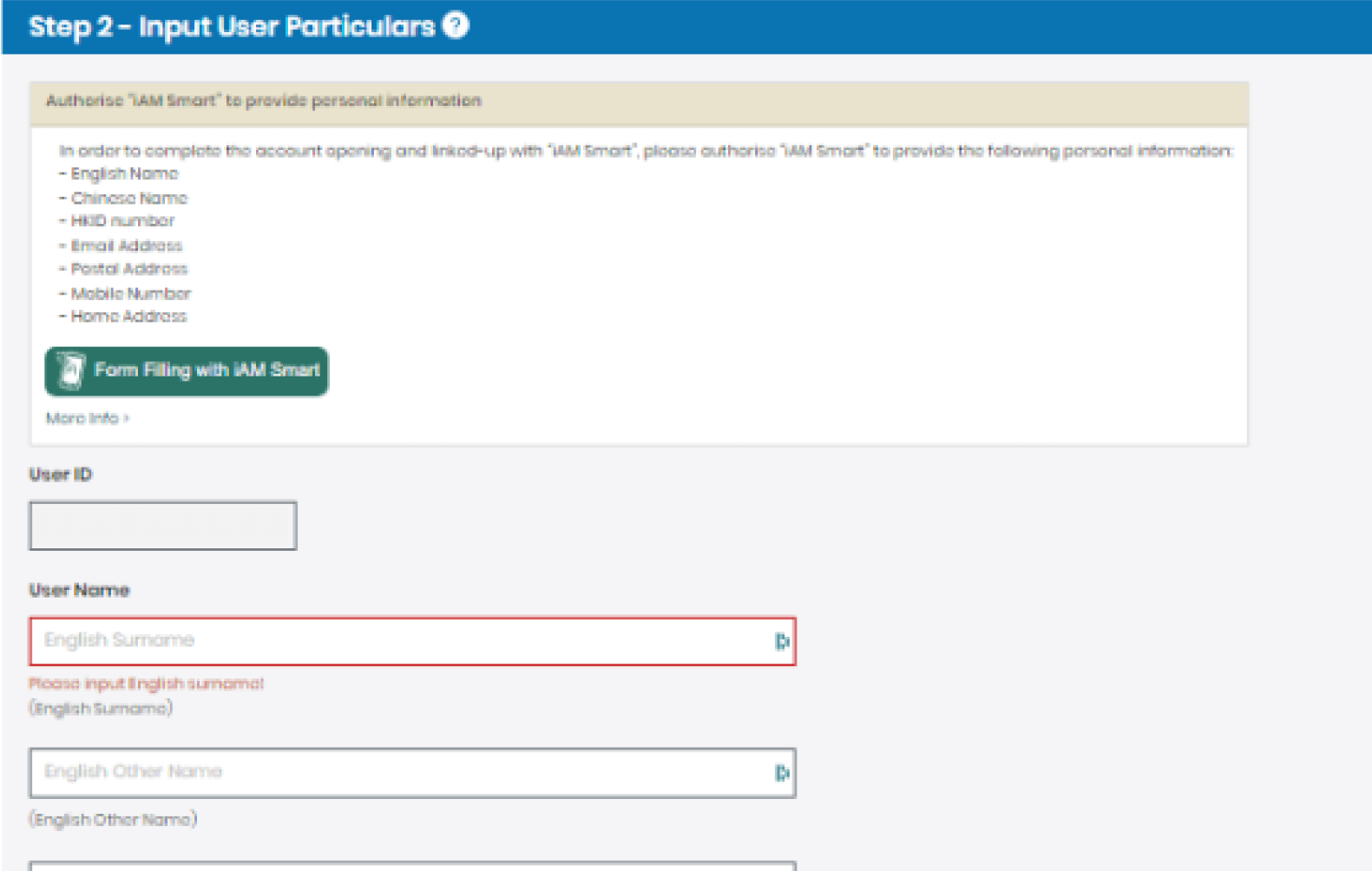
Upload your identification document. You may use a Hong Kong Identity Card, a PRC Resident Identity Card, or a passport. If you submit a Hong Kong passport, you must also provide an HKID. For passports issued by other countries, an HKID is not required.
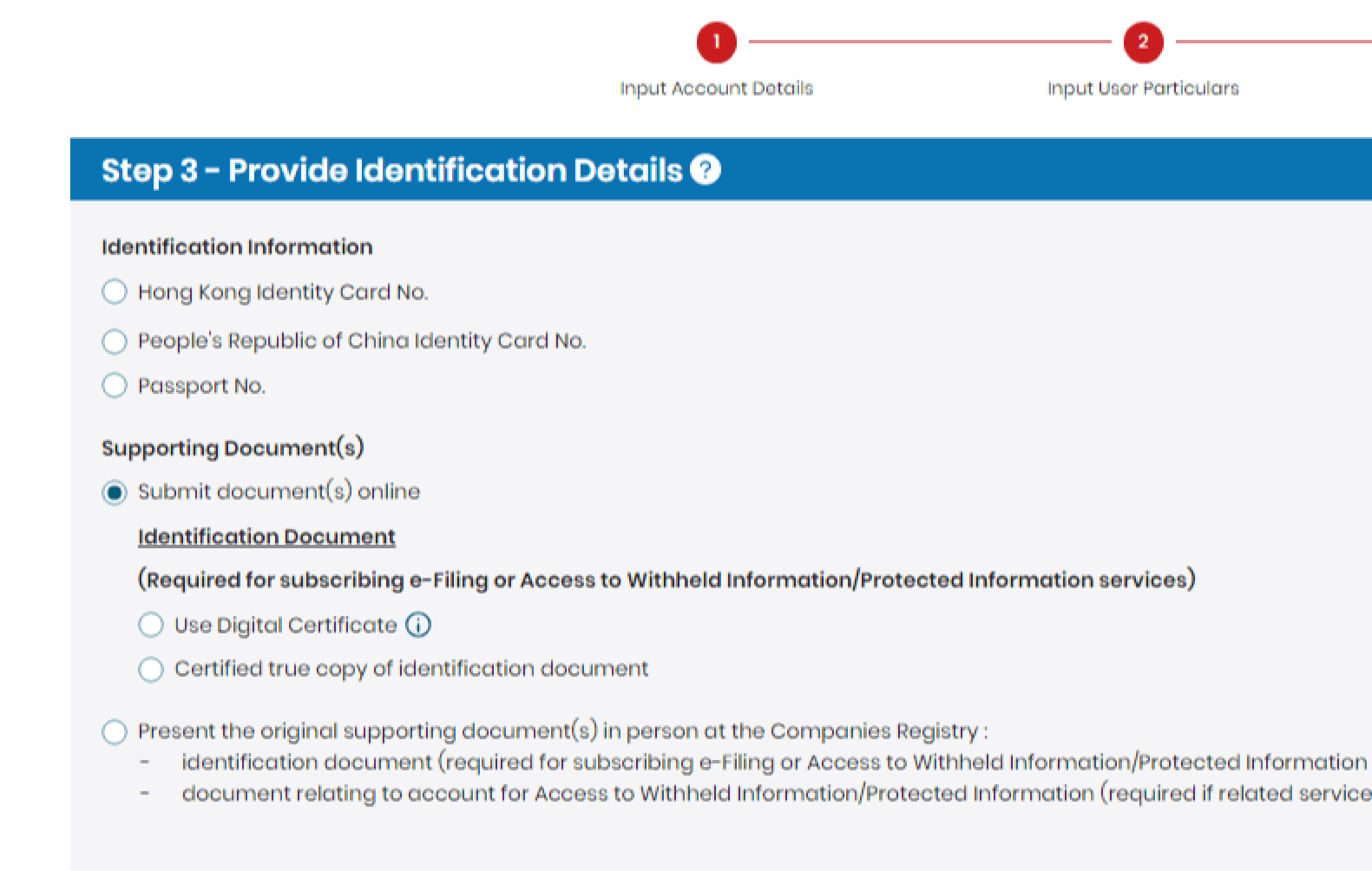

The passport must be a certified true copy by a Hong Kong notary public, a certified public accountant under the Accounting and Financial Reporting Council Ordinance, an authorised court officer, a professional company secretary in Hong Kong, or a licensed trust or company service provider under the Ordinance Cap. 615, or a consular officer of the applicant’s home country for non-Hong Kong residents.
After reviewing your information, submit your application.
The Companies Registry usually activates new accounts within an hour, although verification may take longer if additional checks are required. Once your account is approved, you will receive an activation link by email. After activating your account, you can log in and proceed with the incorporation.
Fill Out the Application
To fill out the application, start by visiting https://www.e-services.cr.gov.hk/ and logging in with your account.
Choose "Incorporation" and select the type of company you want to incorporate. In this example, we’re using a local company limited by shares. You will then need to complete these five steps.
Enter basic information, including the filing language (English or Traditional Chinese), and upload the Articles of Association.
Each founder must sign a copy of the AA for the company’s records, but the version submitted online does not need to be signed.
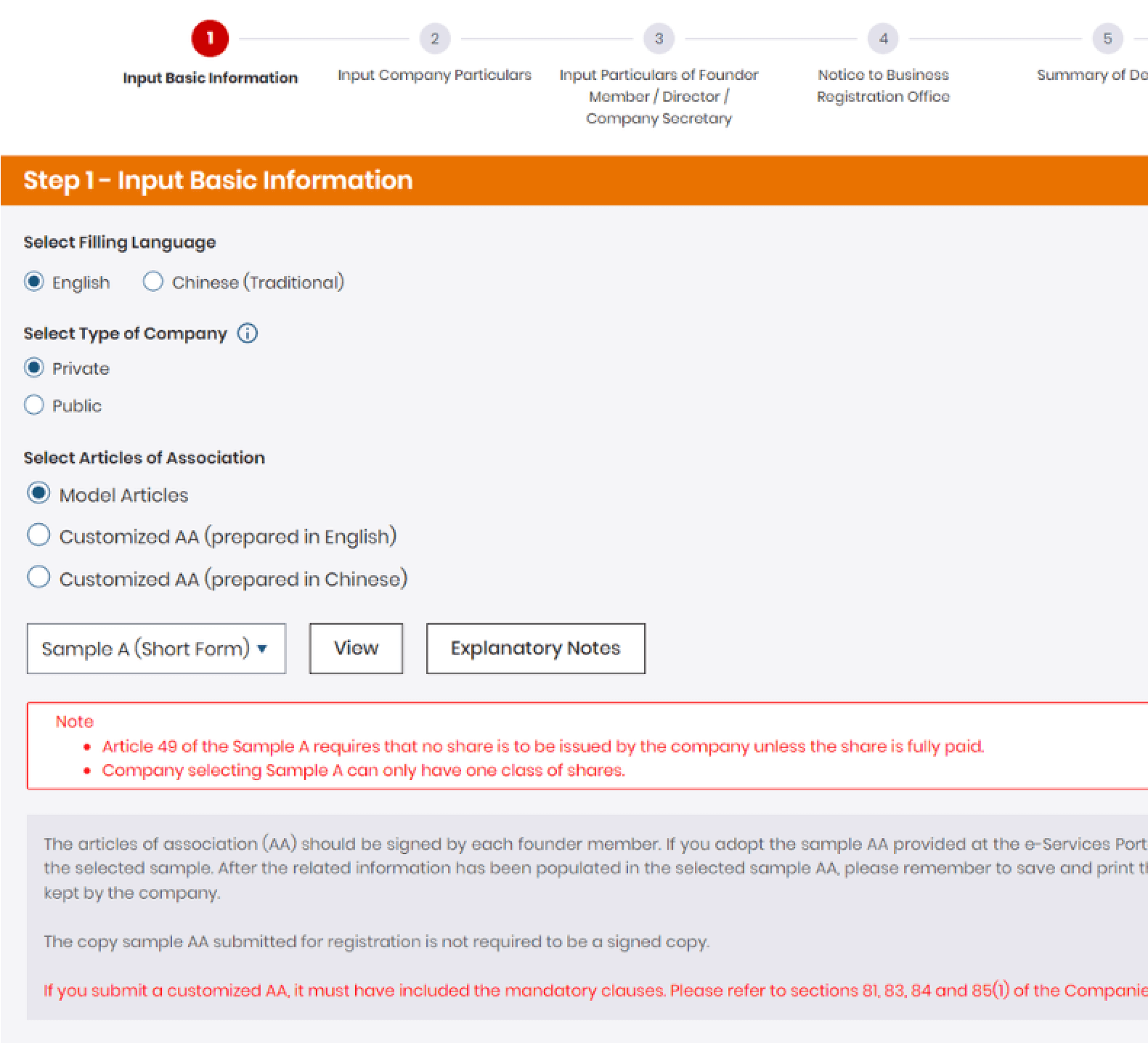
Enter company details: proposed company name, business nature, registered office address (must be in Hong Kong), email address, Hong Kong phone number, share capital structure, and initial shareholdings.
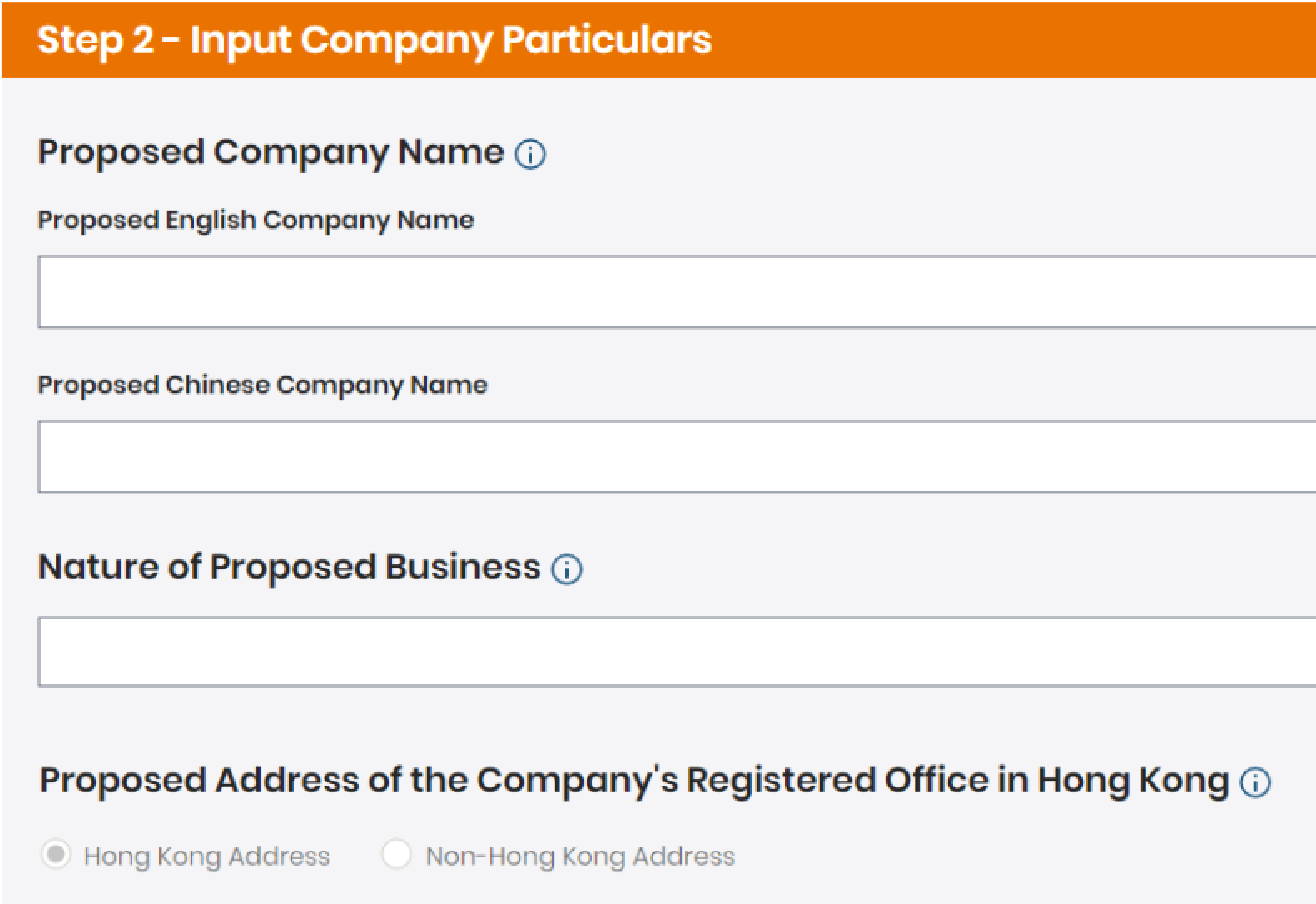
Provide information for the founder member, directors, and company secretary. This includes names, addresses (Hong Kong or overseas), and identification documents (HKID or passport).
Enter “Nil” for any field that does not apply.
When adding a director, tick the consent box to allow electronic signing. If not, you will need to submit Form NNC3 within 15 days of incorporation.
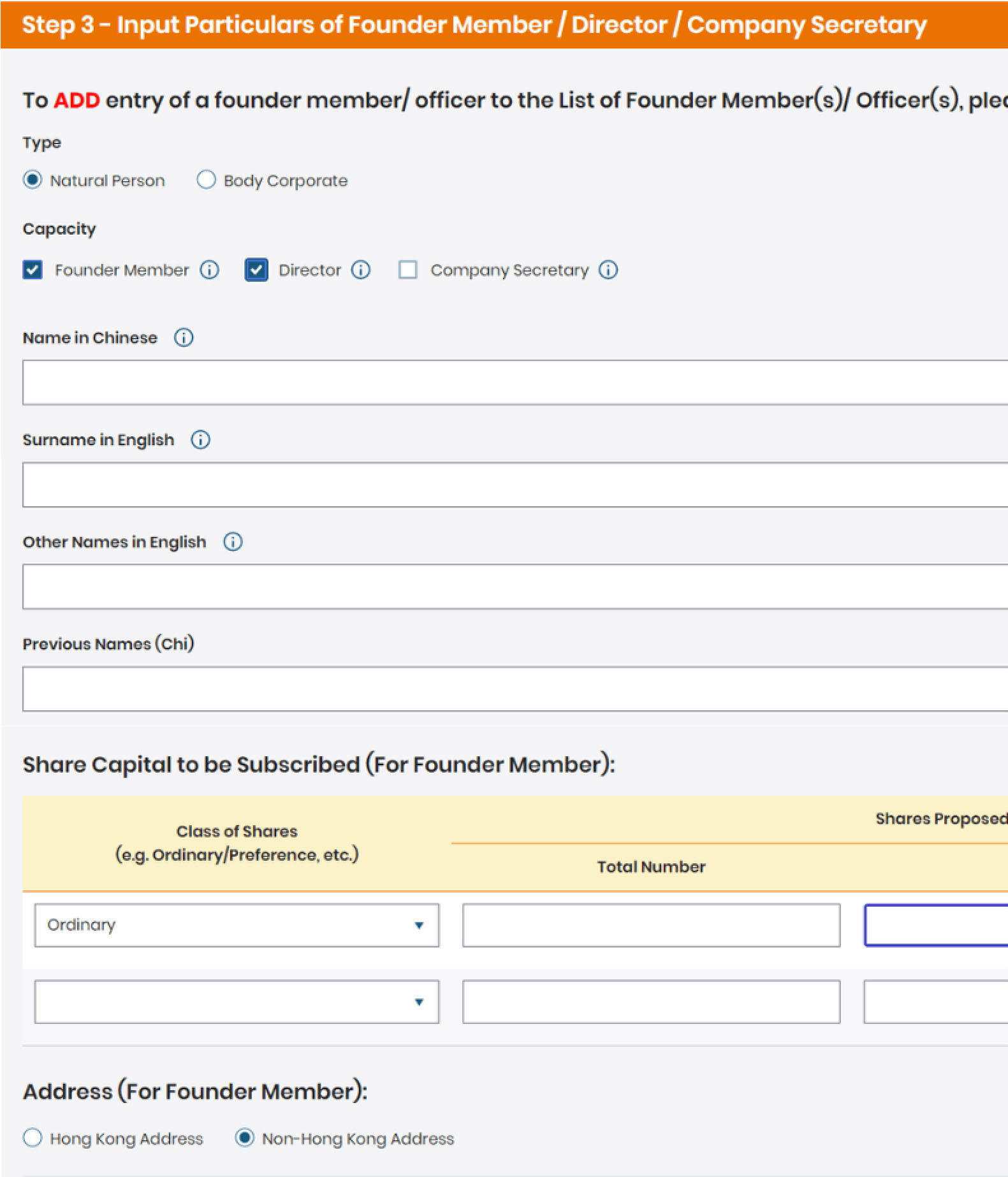
Tick the box to send a mandatory notice to the Business Registration Office.
Choose the business registration certificate (BRC) period: tick "Yes" for a 3-year period or "No" for 1 year.
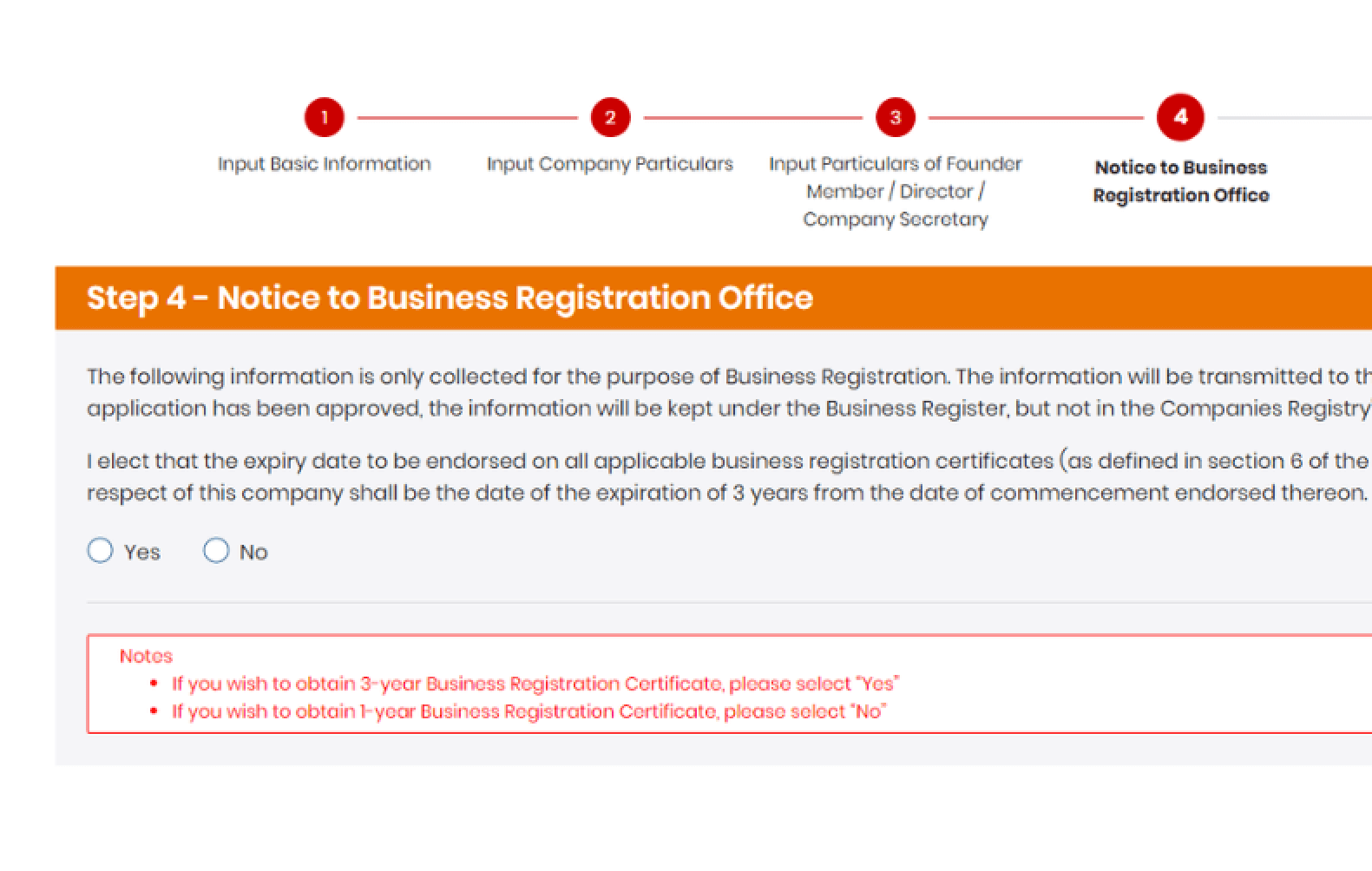
Review all information carefully, then sign and submit the application electronically. You may sign using your user ID, a digital certificate, or iAM Smart.
After signing, pay the required fees through your deposit account at the e-Services Portal, or by credit card, digital wallet (Apple Pay / Google Pay), PPS Shop&Buy, or FPS.
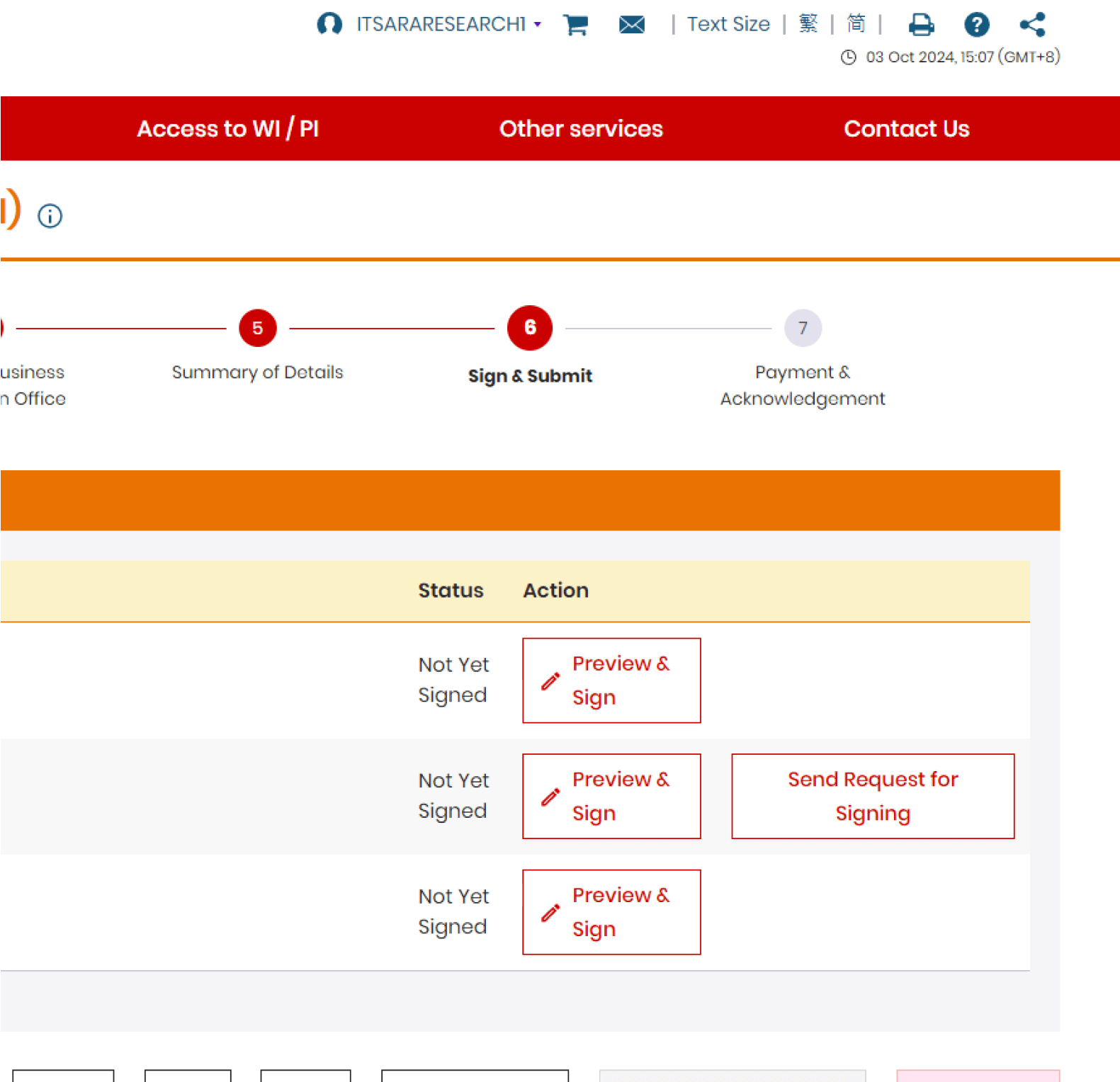
It is recommended to pay immediately after submitting the forms. If another applicant submits and pays for an identical company name before you, your chosen name will no longer be available.
After payment, the Registry will begin processing your application. Many straightforward applications are approved within an hour, but may take up to 5 days or longer if additional checks are needed.
You can track progress by logging into your e-Services account and checking your message notifications. Once approved, you will receive your incorporation documents electronically through the portal.
Alternatively, users can complete the application offline by downloading the specified forms. After filling out the completed form, submit it along with the necessary documents and fees at the 14th floor, High Block, Queensway Government Offices, 66 Queensway, Hong Kong.

Documents Issued After Successful Application
If you have successfully registered your Hong Kong company, you should receive two documents from the government: the Certificate of Incorporation and the Business Registration Certificate. These two documents are important to operate legally in Hong Kong.
For online registrations, these certificates are issued as PDF files and hold the same legal status as paper versions. If needed, certified paper copies can be requested from the Company Registry and IRD websites and will be mailed to your registered address.
Certificate of Incorporation (CI)
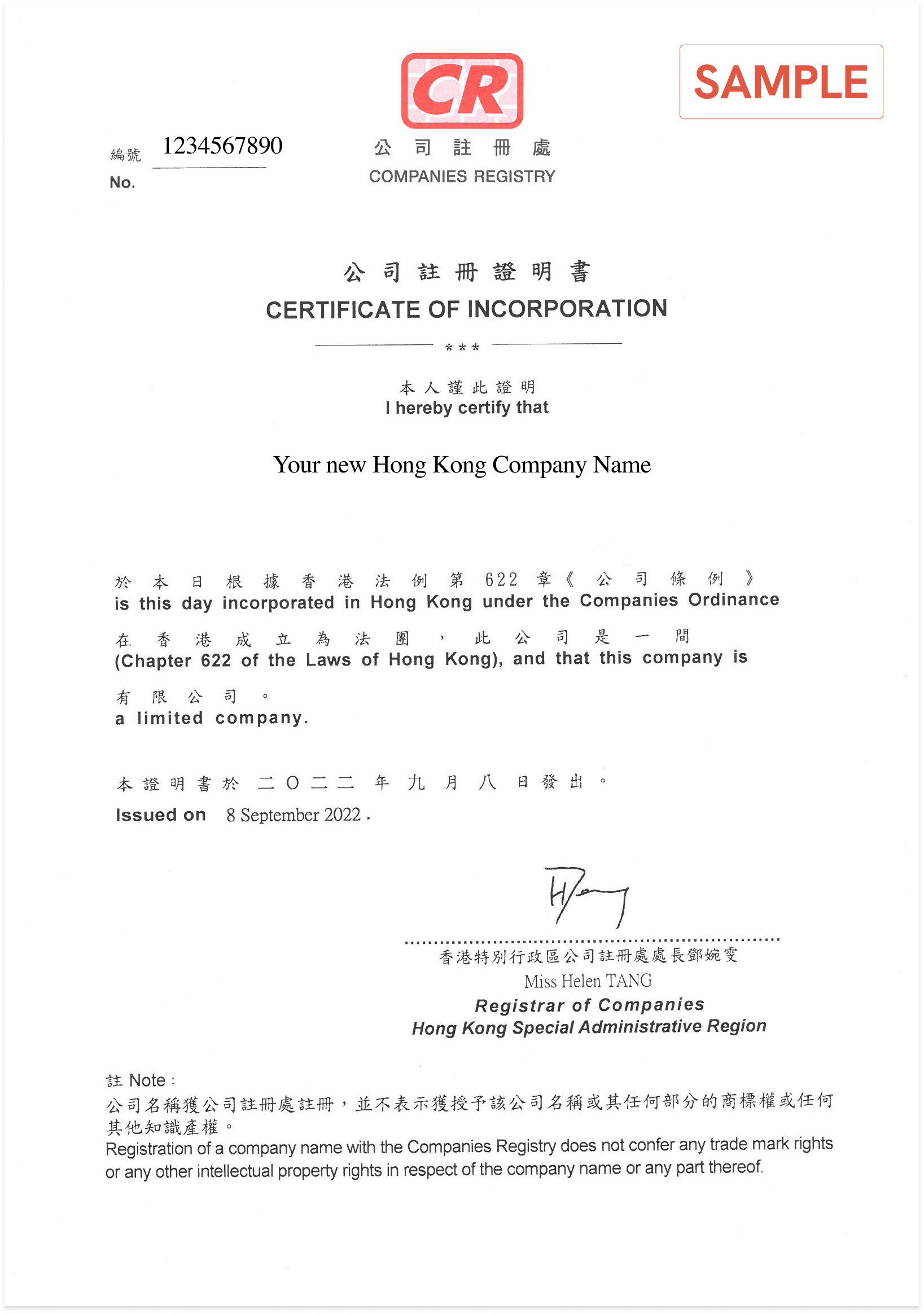
The Certificate of Incorporation proves the company's legal registration. It includes an 8-digit company registration number, the official company name, the incorporation date, and the certificate type.
The certificate is issued in English or Traditional Chinese, depending on the language used for your incorporation, and your company’s basic registration information can be searched by the public through the Companies Registry’s e-Services Portal.
Business Registration Certificate (BRC)
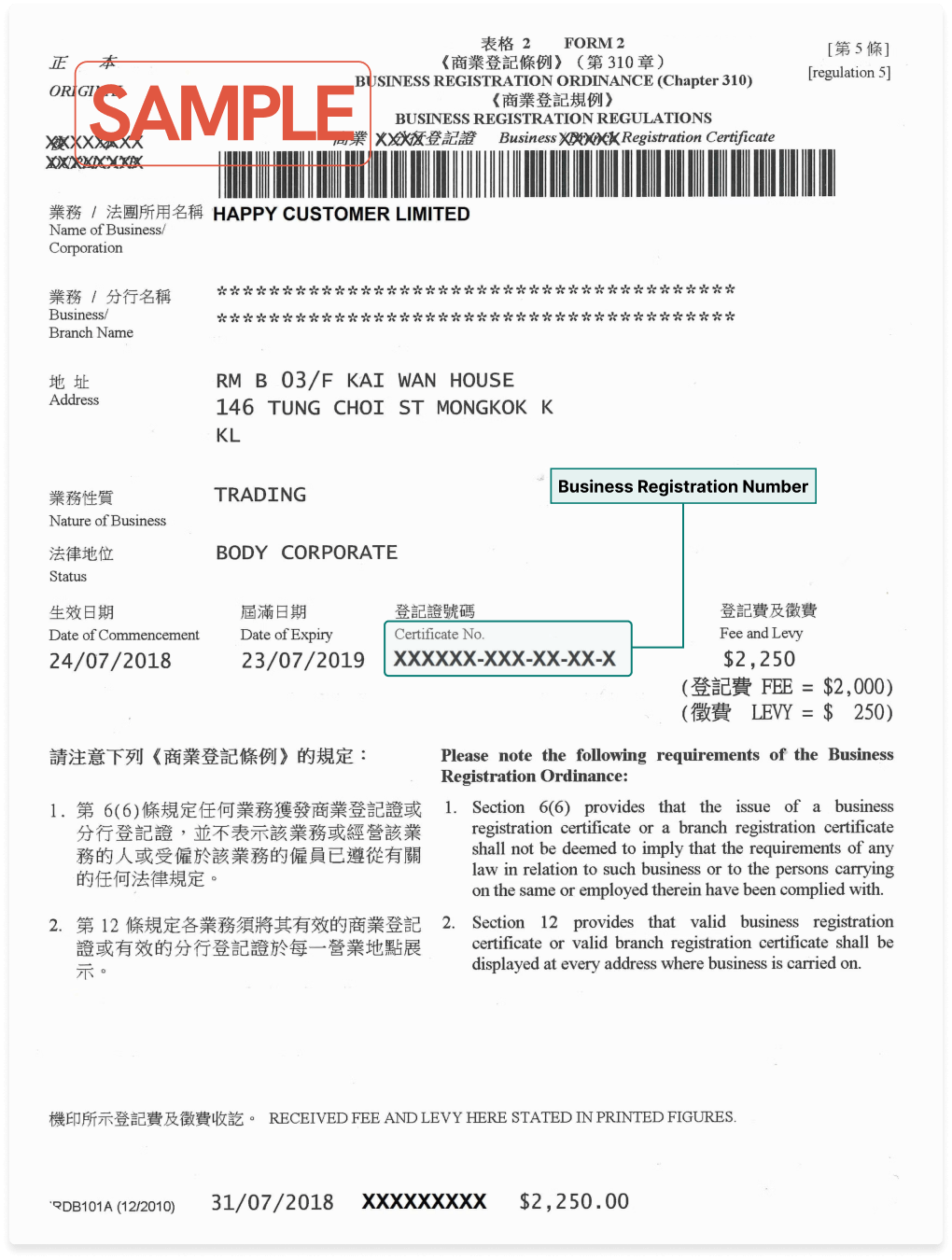
The Business Registration Certificate (BRC) verifies a company's legal right to operate in Hong Kong and serves as an identifier for tax purposes.
Each BRC includes your business name, registered address, the Business Registration Number (now also used as the Unique Business Identifier), the registered business nature, and the issue and expiry dates of the certificate. The BRN and UBI printed on the certificate act as your company’s main identifier for tax and regulatory purposes.
You can choose a BRC with a validity of either 1 year or 3 years, and you'll need to renew it accordingly to continue operating legally.

Post-Incorporation: What’s Next?
Incorporation is only the first milestone. Once your Hong Kong company is officially registered, there are documents to receive, records to maintain, and ongoing obligations to meet. This section gives you a clear overview of what happens next, so you know exactly what to prepare for.
Receive Key Corporate Documents
Once your company is incorporated, you should receive key documents from the company secretary, including:
- Share Certificates: Official documents that verify an individual’s ownership of shares in the company.
- Register of Members: A comprehensive record of all shareholders, including their personal information and the number of shares they hold.
- Register of Directors: A list of all current directors of the company, including their personal details.
- Register of Company Secretaries: A document that maintains the records of company secretaries.
- Board Resolutions: This document is a written decision made by a company's board of directors. It serves as a record of decisions taken during a board meeting and ensures that important actions and policies are officially approved and documented.
- Significant Controllers Register: A document detailing individuals or entities with significant control over the company. It also identifies the designated representative, who is authorised to act on behalf of the company and is responsible for preparing the significant controllers register.
Maintaining these records accurately is essential. The Companies Registry may request them for inspection at any time, and banks or service providers may also ask for them when you apply for a business account.

Fulfil Your Ongoing Business Obligations
Once your company is incorporated, there are several ongoing obligations required under Hong Kong law to keep your business in good standing.
Statutory Renewals
Once your company is incorporated, you must complete the following statutory renewals to keep the business compliant:
- Renew your Business Registration Certificate either every year or every three years, depending on the validity period you selected when the certificate was first issued. Renewal requires submitting the application and paying the prescribed fee to the Inland Revenue Department.
- File your Annual Return (Form NAR1) with the Companies Registry within 42 days of your incorporation anniversary each year, updating the company’s information on the public register.
Failing to complete these renewals on time can result in significant late penalties, and the company may be considered non-compliant under Hong Kong law.

Accounting and Tax Filing
Hong Kong companies must keep proper accounting records from the date of incorporation. Even if your company has no revenue or transactions, you are still required to maintain accurate books and inform the Inland Revenue Department (IRD) when there is no financial activity for the period.
Monthly bookkeeping is not mandatory. Instead, companies must file annual returns and submit a Profits Tax Return once a year. For newly incorporated companies, the first Profits Tax Return is usually issued 18 months after incorporation, which provides time to set up your accounting process.
You do not need to hire an accountant immediately if your early operations are simple or your transaction volume is very low. Many Hong Kong accounting firms charge based on the number of transactions, so waiting a few months often results in more accurate and predictable quotes.
However, if you are unsure how to handle accounting records, engaging an accountant earlier can prevent compliance issues and avoid costly corrections later.


If you incorporate your company through Statrys, our team can share a list of accounting firms that fit your industry and expected transaction volume. This helps you compare estimated fees and choose the service that suits your needs.
Annual General Meeting
Under the Companies Ordinance, most Hong Kong companies are required to hold an Annual General Meeting (AGM) for each financial year unless an exemption applies. An AGM is not required if the company is a single-member company, if all shareholders agree to dispense with the AGM, or if all matters are dealt with by written resolution.
For companies that must hold an AGM, the deadline depends on the company type:
- A private company or a company limited by guarantee must hold its AGM within 9 months after the end of its accounting reference period.
- A public company must hold its AGM within 6 months after the end of its accounting reference period.
The AGM typically covers approval of financial statements, appointment of auditors, and key corporate decisions. Your company secretary is usually responsible for preparing the meeting agenda, circulating notices, and keeping minutes.
Significant Controllers Register (SCR)
Hong Kong companies incorporated under the Companies Ordinance (except listed companies) must identify any “significant controllers” and keep a Significant Controllers Register (SCR). This includes anyone who owns more than 25% of the shares or voting rights, can appoint most of the directors, or has significant influence over the company’s decisions.
The SCR must be kept at the company’s registered office or another place in Hong Kong and must be kept accurate and up to date. It is not filed with the Companies Registry, but it must be available for inspection by law enforcement officers on demand.
Companies must also appoint a designated representative to assist with SCR-related enquiries. In most cases, your company secretary will take care of preparing and maintaining this register.
Understand Your Tax Obligations
Once your Hong Kong company is incorporated, it is important to understand the tax framework you will operate under. The Inland Revenue Department (IRD) administers all taxation matters, and Hong Kong follows a territorial tax system, meaning only profits sourced from Hong Kong are taxable.
Below is a brief overview of the concepts new business owners should be aware of.
Corporate Taxes
In Hong Kong, the main corporate tax is called “profits tax”, which applies to income earned within the territory. Most smaller companies benefit from the two-tier system, which taxes the first HKD 2 million of assessable profits at a reduced rate.
- For corporations, the first HKD 2 million of assessable profits is taxed at 8.25%, and any amount above that is taxed at 16.5%.
- For unincorporated businesses (e.g. sole proprietorships and partnerships), the first HKD 2 million is taxed at 7.5%, and profits above that are taxed at 15%.
Hong Kong does not impose value-added tax (VAT), capital gains tax, withholding tax on dividends or interest, or tax on overseas-sourced profits (unless they fall under the refined foreign-sourced income exemption regime).
The IRD issues Profits Tax Returns every April. Filing deadlines depend on your accounting year-end, with extensions commonly granted until November for companies closing their books in December.
Failure to file returns on time may result in penalties or estimated assessments issued by the IRD.
Offshore Tax Exemption Status
Hong Kong taxes profits based on where they are generated, not where the company is registered. If a Hong Kong company can demonstrate that all of its profit-generating activities take place outside Hong Kong, those profits may qualify for offshore tax exemption, meaning the profits are taxed at 0%
However, offshore status is not automatic. A company must submit an offshore tax claim when filing its Profits Tax Return, supported by evidence demonstrating that no profit-generating activities occurred in Hong Kong. The Inland Revenue Department (IRD) will then review the claim through a profits tax enquiry and determine whether the company qualifies for offshore tax exemption status.
Evidence typically focuses on where the core activities that generate profit actually take place. For example, where contracts are negotiated and executed, where services are performed, and where key management decisions are made.
If any of your profit-generating operations take place in Hong Kong, the IRD may treat the related profits as Hong Kong-sourced and charge profits tax accordingly.

Open a Business Account
After incorporation, most companies open a business account to begin receiving and sending payments. Traditional banks in Hong Kong usually require certified company documents, details about the business, and sometimes an in-person meeting with the directors.
These requirements can be difficult for overseas founders or companies operating remotely. As a result, many entrepreneurs look at alternatives such as virtual banks or payment service providers, which allow fully online applications, faster onboarding, and the same core functions most businesses need, such as making local or international payments.
If you registered your company through Statrys, our team can guide you through the application process for a Statrys multi-currency business account. Approval is subject to our compliance review, and the account operates as a business payment solution rather than a traditional bank account.


Statrys: One-Stop Solution for Hong Kong Company Formation and Business Account
Setting up a company in Hong Kong is only the beginning. What you really need is a smooth path for the rest of the journey, from incorporation to everyday business payments, all without complexity. That is the experience Statrys aims to deliver.
As a licensed Trust and Corporate Service Provider, Statrys offers an all-in-one incorporation package that covers everything you need to register and maintain a Hong Kong company. Our team prepares the documents, handles the filings, and ensures you remain compliant throughout the year.
Once your company is set up, Statrys fast-tracks your application for an in-house multi-currency business account that supports both local and international transfers, with direct human support. Every client is assigned an account manager who remains reachable, responsive, and familiar with your business.
With both services in one place, you can start and run your company in Hong Kong with peace of mind.
Below is an overview of what Statrys offers:
Incorporation Services
- Verification of company name availability
- Preparation and filing of incorporation documents
- Drafting of Articles of Association
- Certificate of Incorporation
- Business Registration Certificate (1-year)
- Company chops (corporate seals)
- Government fees (HKD 3,970 included)
- 24/7 access to company documents via an online platform

Company Secretary Services
- Company secretary (1 year)
- Designated representative (1 year)
- Filing of Annual Return (NAR1)
- Automated reminders for filing deadlines
- Maintenance of significant controller register
- Maintenance of statutory records
- Preparation for the Annual General Meeting (AGM)

Registered Address in Hong Kong
- Registered address (1 year)
- Scanning and forwarding of mail
Business Account
- Assistance with in-house business account application; approval in less than 5 days (subject to approval)
- Hold, receive, and send funds in 11 major currencies
- Local and international payments, including FPS, CHATS, and SWIFT transfers
- FX fees as low as 0.1%
- Dedicated account manager for personalised support
Accounting
- Recommendation and quote tailored to your revenue and transaction volume

FAQs

Can a foreigner register a company in Hong Kong?
Yes. Hong Kong allows 100% foreign ownership. You don’t need to be a resident or hold a local passport to set up a company.

Do I need a local director to set up a company in Hong Kong?
No, the director can be of any nationality.

Do I need to travel to Hong Kong to register a company?
No. The entire incorporation process can be completed online if your company has only individual shareholders, not corporate shareholders.

Do I need an office in Hong Kong?
A Hong Kong company must have a registered address that is a physical office address in Hong Kong, but you are not required to rent or maintain your own space. You can use a virtual office service provider or a corporate services provider can supply one for you.

How long does it take to register a company in Hong Kong?
Most applications are approved within 1 to 5 business days, but it can take longer if corporate shareholders are involved.

How much does it cost to register a company in Hong Kong?
Government fees start at HKD 3,745. Total setup costs with a service provider generally fall between HKD 6,000 and HKD 12,000.

Can I open a business account without travelling to Hong Kong?
Yes. Some financial institutions offer remote or video-based account opening, although approval may still require additional checks. Fintech providers such as Statrys also support fully online applications.

What is the simple way to register a company in Hong Kong?
You can use a one-stop provider that handles company setup, registered address, secretary service, and business account support, like Statrys.

Get your Hong Kong business account open in a few days
100% online application
No account opening fee, no initial deposit
Dedicated account manager







